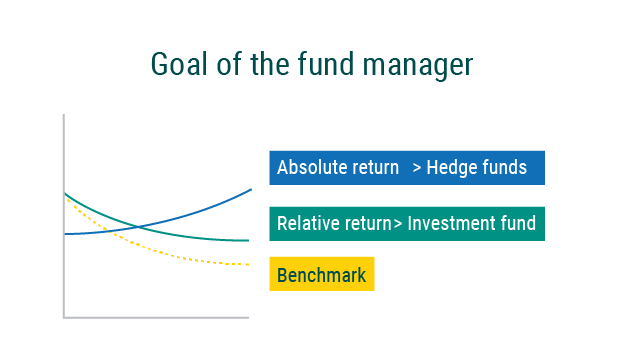Hedge funds are investment funds. However, unlike ‘regular’ investment funds, hedge funds use more strategies to achieve returns. Regular investment funds invest according to a comparative index, the benchmark. The fund manager’s goal here is to achieve a return that is better than the benchmark. He can only achieve returns in a rising market. This is also known as taking a long position. Regular investment funds are therefore also referred to as long-only funds. Hedge funds have a broader investment policy that gives the fund manager more freedom to try to achieve returns. For example, he can also go short. The fund manager can diversify his investment portfolio by using different strategies.
Hedge funds fall under the category of complex investment products. It is therefore important that you inform yourself well before you buy a hedge fund.
There are a number of things that are the same with hedge funds as with ‘regular’ investment funds, such as having a KIID and a prospectus. They can also be open-end or closed-end.
The price of a hedge fund is more sensitive to market movements than the price of a regular investment fund. That sensitivity is expressed in the beta. The beta of a hedge fund indicates how the price of that hedge fund moves compared to a benchmark. Where the beta of the benchmark is 1. If the beta of the hedge fund is higher than 1, the hedge fund will perform particularly well in rising markets. But the reverse of course also applies: it will do particularly badly in falling markets. The higher the beta of the hedge fund, the more sensitive the hedge fund is to market movements.
Many hedge funds have the goal of achieving absolute return, regardless of the market conditions. Most long-only funds focus on relative return, they want to beat the benchmark. An absolute return fund wants to limit large losses. For this it uses derivatives with which it gives a certain protection to the underlying investments. The fund manager accepts that this means that he cannot take full advantage of a rising market.

Hedge funds have the option to go short (short-selling). Regular investment funds do not have that option, they only invest long-only. By going short, a hedge fund can also achieve returns in falling markets.
How does short-selling work? If the fund manager of a hedge fund does not expect a good performance of a particular share, he may decide to go short on that share. He then borrows shares for a certain period of time and then immediately resells them. He therefore sells shares that he does not actually own (short). If the price of the share falls in the short period, the fund manager can buy the shares at a lower price than at which he previously sold them. In this way he repays the borrowed shares and makes a profit on the shares. However, if his expectations do not materialise and the price of the share rises, he will make a loss. He must then buy the shares at a higher price than at which he previously sold them. The fund manager does not actually have to take short positions, he can also mimic them with derivatives (options and futures).
The possibility of using different strategies means that the costs of a hedge fund are often higher than the costs of a regular investment fund. The management costs are usually a fixed percentage of the assets under management of the hedge fund. In addition, the fund manager of a hedge fund can calculate a performance-dependent fee. The purpose of this performance-related fee is for the manager to share in the success together with the investors. He will do his utmost to achieve the highest possible return. In exchange for that effort, the investor gives him a piece of the return. Performance-related fees from hedge funds are usually between 5 and 20% of the positive annual return.
Hedge funds offer a number of advantages compared to regular investment funds:
funds offer a number of advantages compared to regular investment funds:
In addition to the general risks of investing, investing in hedge funds involves the following risks:
The range of hedge funds at ABN AMRO consists of different types of hedge funds and offers single manager funds and multi manager funds, also known as funds of hedge funds. ABN AMRO preferably offers investors fund-of-funds (FOF). Such solutions give you access to a hedge fund portfolio with a good spread over various strategies, including absolute return and short-selling. ABN AMRO continuously monitors these hedge funds.
With our professional and reliable platform My Dealingroom, you can place orders 24/7 to buy or sell investments. You can choose from a wide range of investment products.
For the active investor: